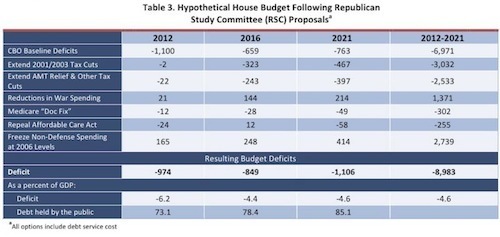The GOP Budget Challenge
The Concord Coalition has a helpful analysis of the budget debate that we're still waiting for. That is to say that leaving aside the question of the FY 2011 appropriation, how does Paul Ryan write a budget that extends the Bush tax cuts, rules out all other tax increases, and nonetheless gets a budget deficit lower than what the White House has preposed. The short answer is that they can't:

The first hypothetical budget assumes that Republicans repeal the ACA and follow current policy in other areas — extend all of the expiring tax cuts, reduce war spending over the next ten years (roughly following Obama Administration and CBO estimates), and prevent drastic cuts in Medicare physician payments. It then applies spending cuts proposed by the Republican Study Committee (RSC), which would freeze non-defense discretionary spending at 2006 levels and then cut another $200 billion in other spending. In all, the RSC estimates that its spending cuts would reduce the deficits by $2.7 trillion (including debt service savings) over 10 years.
Under this scenario, the resulting deficits would be $2 trillion larger over 10 years than the CBO baseline ($9.0 trillion vs. $7.0 trillion). Deficits as a percent of GDP would never drop below 4.0 percent (2018) or $763 billion (2015). Debt held by the public would rise to 85.1 percent in 2021.
Alternatively, you can throw in Paul Ryan's plan to privatize Medicare and then cut Medicare outlays:
There has also been some discussion of including fundamental entitlement reform in the House Republicans' budget. While the appropriate committees of jurisdiction must write specific legislation within the overall framework of the budget resolution, Ryan could assume entitlement changes consistent with known options. One such option is his proposal (made with former Clinton Administration OMB Director Alice Rivlin) to reform Medicare by turning it into a voucher-based system. CBO estimates that this would reduce deficits over the first 10 years by $389 billion.
Making these changes, combined with the spending cuts in the RSC proposal, gets the Republican budget to $7.5 trillion in deficits relative to the Administration's $7.2 trillion and CBO's $7.0 trillion. In this scenario, debt held by the public as a percentage of GDP increases over the 10-year period from 72.8 percent to 78.9 percent.
This is the budget debate the administration wants to be having—a debate about a hypothetical House Republican budget that will include draconian spending cuts and higher deficits than the administration is proposing.


Matthew Yglesias's Blog
- Matthew Yglesias's profile
- 72 followers



